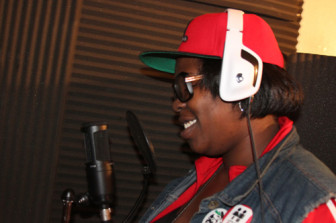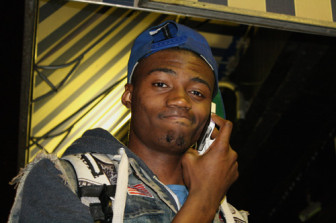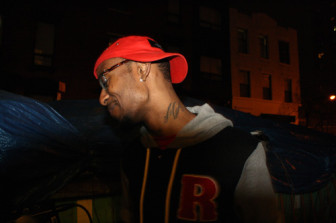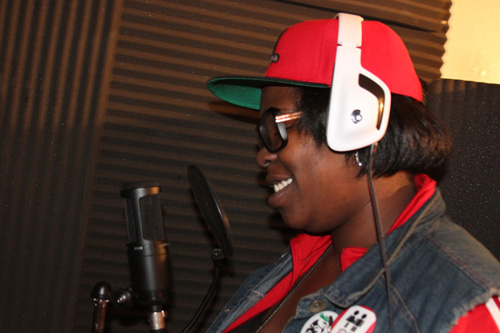The New York Bureau recently compiled profiles on three young New Yorkers with one thing in common: a history of time spent in lock-down facilities. Alex Eidman reports on how -- through music -- the three are working to get their lives on track and turn longtime dreams into reality.
Niasia Alvarez, aka Lady Infinite

Alex Eidman / JJIE / New York Bureau
Niasia Alvarez, 23, recording her music in a makeshift studio at a friend’s apartment on the Lower East Side. Alvarez works at The Door during the week, an organization that provides services for at-risk youth.
Niasia Alvarez, 23, knows what it’s like to be alone.
At 15, she ran away from her home in Hunts Point. She said her parents were hardworking people, but didn’t show her the love and attention she craved.
“My sister got my parents attention by getting arrested for selling heroin at 14,” Alvarez said. “I thought I could do the same by running away.”
Alvarez said she lived on the streets for two years. At night, she slept on the train, in the park and, when she could, crashed at friends’ houses. She also attended Fannie Lou Hamer Freedom High School, and said she got straight A’s.
“I loved school — it was the only kind of stability I had in my life at the time,” Alvarez said.
Alvarez said she was always looking for ways to make money. In her sophomore year, she met two older guys in the neighborhood and with them, engaged in frequent nighttime robberies.
“We had to do certain things to support our habits and our lifestyles,” Alvarez said. “That included robbin’ and stealin’. We took wallets, did stick ups, we was buck wild.”
Alvarez was almost 17 when she was arrested for the first time, for possession of marijuana. She said that because she had no prior convictions and was a good student, she was placed on supervision, a lighter sentence than probation.
By her junior year, Alvarez said she was regularly smoking marijuana, and continued to steal. She said her teachers often found her dozing off in class, but were lenient because they liked her.
Eventually Alvarez’s teachers called her parents to express concern. She said the school was shocked to find out she hadn’t been home in two years.
Alvarez spent time at a Manhattan shelter affiliated with Covenant House, a national organization that helps kids escape homelessness. For a while she said she had a room on Burnside Avenue in the Bronx. Alvarez said she paid rent by selling marijuana and crack.
She said Covenant House decided she needed stability and placed her in a non-secure residential center in the Bronx run by the Catholic Guardian Society. That lasted for a few months, until Alvarez said she and some friends threw a party with vodka and marijuana and trashed the place.
She said she was transferred to a medium-security Catholic Guardian facility for girls in Staten Island in late 2007.
Alvarez said the group home was a dangerous, scary environment. She recalled staff frequently stealing from female residents and having sex with them. Violent outbursts from other girls were a regular occurrence. The hostile environment caused her to reassess her behavior.
“I saw how crazy that place was,” Alvarez said. “And I knew I was done being wild. I didn’t want to be in there forever.”
Alvarez said she wanted to return to her high school for senior year, but said the group home wouldn’t allow it, and instead enrolled her in a GED program.
“I was devastated, because I had busted my ass getting good grades,” Alvarez said.
She got her GED in April of 2008, and continued to show good behavior. She said she left the group home in the winter of 2008 and got an apartment in the Lillian Wald Houses on the Lower East Side, where she lives today.
For the past few years, Alvarez said she has worked as an early childhood educator in nurseries and schools. She said she often takes part-time service industry jobs to help pay the bills.
In 2011, she began coming to The Door, an organization that provides services to at-risk youth, and soon became a regular in the music studio. She was eventually chosen by the staff to work there as a mentor, and said she now knows what she would ultimately like to do with her life.
“They don’t have a place like The Door in a lot of cities,” Alvarez said. “I am lucky to have this safe space to come to, to hang out and practice my music. My dream is to start a place like The Door that provides resources to kids who don’t have them.”
Michael Yan, aka Polite

Dominique Lemoine / JJIE / The New York Bureau
Michael Yan, 21, relaxes outside the Sapphire Lounge before their monthly open mic night. He was released from Rikers Island last December and is now trying to make it as an R&B singer.
Michael Yan, 21, said he was 5 years old when his sister scalded her foot in the bathtub of their Bedford Stuyvesant apartment. Yan said the hospital called the New York City Administration for Children’s Services, who placed him and his sister in foster care.
For the next two years, Yan said he bounced around foster care facilities in The Bronx, Queens and Brooklyn. At 8, he said he was expelled from school for fighting and transferred to Mount Pleasant Cottage School, a program for kids with behavioral issues.
Yan remembers a staff member, Pastor Chris, sitting him down at a piano to teach him how to read and write music. He quickly realized what he wanted to do with his life.
At the age of 13, he said he was transferred to The August Aichhorn Center.
Yan said he pined for the freedom he had at Mount Pleasant, but said he was thrilled to find a musical companion in Eric Dawkins, a younger inmate that he quickly bonded with through music. He worked on his R&B singing, and helped Dawkins perfect his hip-hop skills. Yan said he envisioned one day performing in front of a packed house.
Yan was released from August Aichhorn at 16 and went home to live with his mom. Facing no restrictions for the first time in his life, Yan said, he developed a rebellious streak.
“I started breaking curfew and going to parties,” he said. “I was like a bird going crazy when it leaves the nest.”
Two years later, Yan was arrested for second-degree robbery. He said he only watched his friends mug someone, but the police caught him running away.
He was taken to Manhattan Central Booking, where a judge placed him in the Fortune Society, an alternative prison program, for six months.
“It was hell for me,” Yan said. “I had to report to probation every day, on top of doing Fortune and being in school.”
Yan said he had no one to help him manage his schedule and became overwhelmed and depressed. After a couple of months, he said he stopped showing up to everything.
A judge issued a warrant for his arrest for violating parole, and Yan said he was sentenced to six months in Rikers Island.
On his first day in jail, Yan said an inmate challenged him to a fight. He was placed in “the box,” the phrase Rikers inmates use for solitary confinement.
He said the only thing that kept him sane was visits from his then fiancé, Sulie Hernandez, and writing and practicing his songs.
Yan was released from Rikers in December 2012. He came home with assistance from the Rikers Island Discharge Enhancement program, which he said helped set him up on food stamps and get his finances in order. He said the readjustment was tougher than he expected.
“I got on the train for the first time in a long time, and I felt like I wasn’t really there,” Yan said. “It did something to my head, being in there so many months. I still have nightmares where I wake up in my cell.”
Yan said he and Sulie were married at City Hall a few weeks ago. He said he’s studying for his GED at Touro College and spends a lot of time in the studio the Door, working on his craft and towards the dream of studying music at SUNY Purchase.
“I’m gonna work as hard as I can to make it happen,” he said.
Eric Dawkins, aka Dolo

Dominique Lemoine / JJIE / The New York Bureau
Eric Dawkins, 18, stands outside The Sapphire Lounge, on the Lower East Side, getting ready to perform at their monthly open mic night. Dawkins spent much of the last five years in a residential treatment center for kids with psychiatric issues and says music helped him express himself when he was away from home.
When he was 6 years old, Eric Dawkins walked to a convenience store near his home in the Bronx. When he walked out, he said he saw his cousin, a local drug dealer, sprawled out on the ground, shot to death.
“It’s like a moment when you wanna think you’re dreaming, but you’re not,” Dawkins said. “Growing up, I saw a lot of things I wasn’t supposed to see.”
In school, he was hyper and aggressive, dropping books on kids’ heads and lighting matches in class. At nine, he was hospitalized for one his outbursts, and he said his seizures often landed him in the emergency room.
Dawkins was diagnosed with attention deficit hyperactivity disorder, known as ADHD, and bipolar disorder when he was 9. It got bad enough that at 13 his mom sent him to the August Aichhorn Center in Manhattan, a New York State run non-profit that serves as a long-term psychiatric facility for teenagers.
Dawkins says he lost many people close to him during his time at August Aichhorn. When he was 14, he said his favorite staff member, Maribel Rosado, whom Dawkins said was a mother-figure to him, died of a sudden heart attack. Before he got out, his 5-year-old niece, his aunt and his mother all passed away.
Dawkins said his sadness was overshadowed by his guilt.
“I was mad at myself,” he said. “My family was going through a lot at this time. Because of my decisions, I wasn’t able to support or comfort them.”
Dawkins found a mentor and friend in Michael Yan, who was an aspiring rapper and singer. Dawkins said Yan encouraged him to explore his creative side and the two became inseparable.
“He’s like a brother, more than a brother,” Dawkins said. “That man took me under his wing and always stood up for me.”
Dawkins started writing lyrics everyday, and collaborated on songs with Yan, who helped teach him structure and flow. They formed a music duo, and performed around the city with Voices UnBroken, a group that helps underprivileged young people get involved in the arts.
Even with a new hobby to focus on, Dawkins struggled to cope with personal losses. At 16, after the death of a close family friend, Dawkins ran away from August Aichhorn. He said he ended up in Rikers Island for a week before the center came to claim him.He said he was released from August Aichhorn on July 23rd, 2012, his 18th birthday, but his freedom was short-lived. Within a month, he was arrested for stealing clothes out of a car.
Dawkins’ said his lawyer managed to keep him out of jail, and he was sentenced to six years of probation. However, he missed his mandatory community service and said he has outstanding warrants.
“Sometimes I think about turning myself in. I’d probably do ten days in Rikers,” Dawkins said. “But after getting a taste of that place, I just can’t handle it right now.”
Today Dawkins lives on friends’ couches and still has bipolar-related seizures that sometimes land him in the hospital. He spends most days writing music, in the studio at The Door and at open mics around the city. His main goal is becoming a successful hip-hop artist. Dawkins said his mind is focused on the present, for better or worse.
“I’m just living,” Dawkins. “You can think about the future, but sometimes you just have to walk and when you get to that point, you get to that point.”
